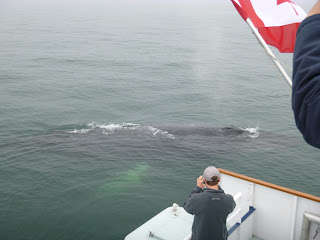How many copepods does a right whale eat?
Learning about whale adaptations.
Dressing up to learn about seal adaptations. Thanks to our volunteer!
Exploring the Bay of Fundy with Quoddy Link Marine. We saw many seabirds including gannets.
A curious whale exploring the boat.
Humpback under the water.
You can see the humpback's blow/spray.
Humpback, note the green glow which is the white flipper under the water.
Humpback fluke identified as Ridgeline.
Some of our group was on the Fundy Odyssey.
Finback whale.
Playing plankton bingo.
Dissecting albatross boluses that were collected on Hawaii to see if any contain plastic. This one contain a large piece of rope.
Squid beak.
Small pieces of plastic removed from the bolus.
This piece of plastic with nails was also removed from one of the bolues.
Using GPS data from student whale sightings to create a marine sanctuary.
Foggy and windier on our second whale watching trip. We saw the Head Harbour lighthouse.
Checking out a seal colony.
Harbour seals lounging at low tide.
Making t-shirts and memories.
We had a lot of fun exploring the marine mammals and seabirds of the Bay of Fundy with the field course participants this week. We thank the US Fish & Wildlife Service for the unique opportunity to dissect the albatross boluses. Now we look ahead to our next field course All Things Marine, which is open to families.





















No comments:
Post a Comment